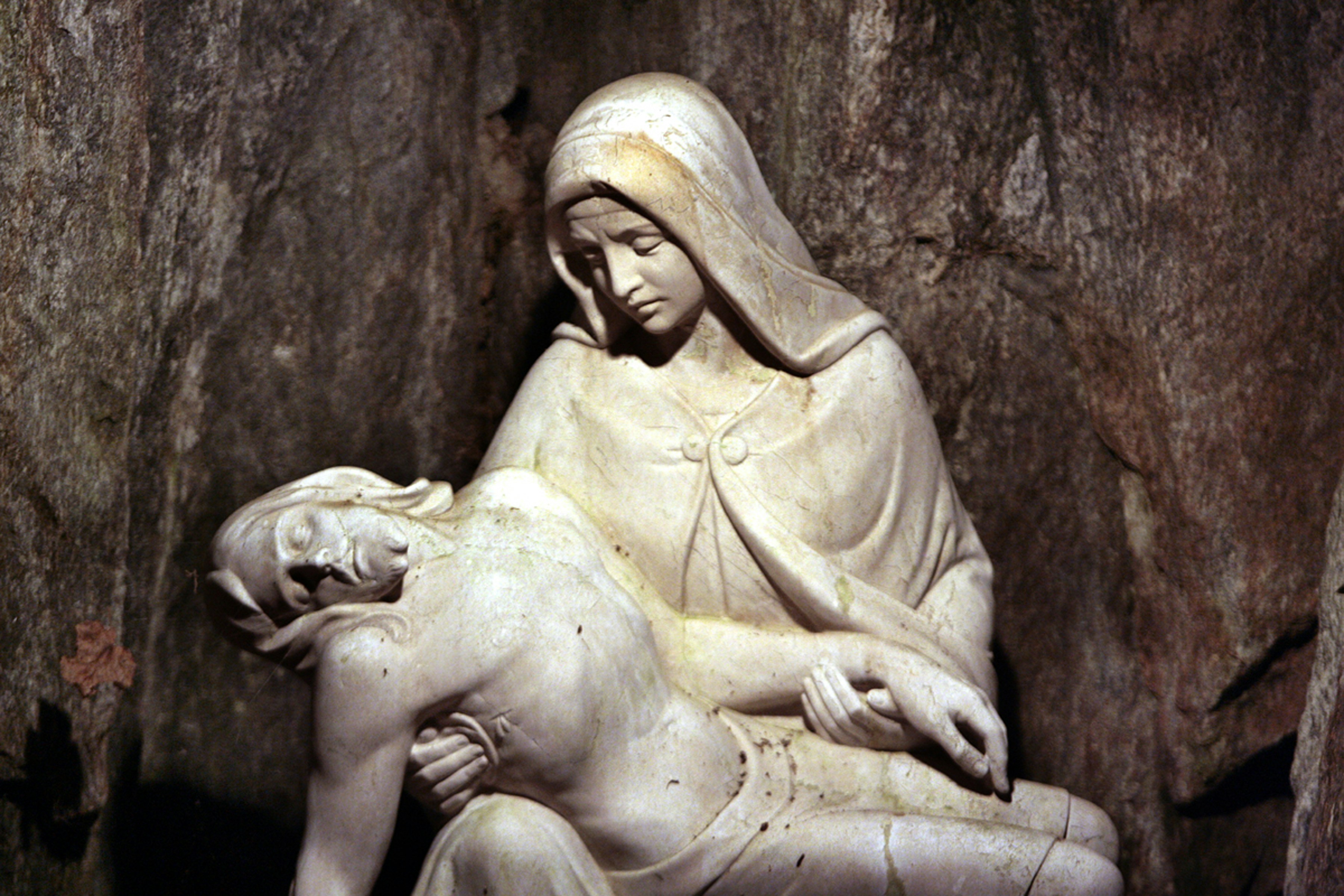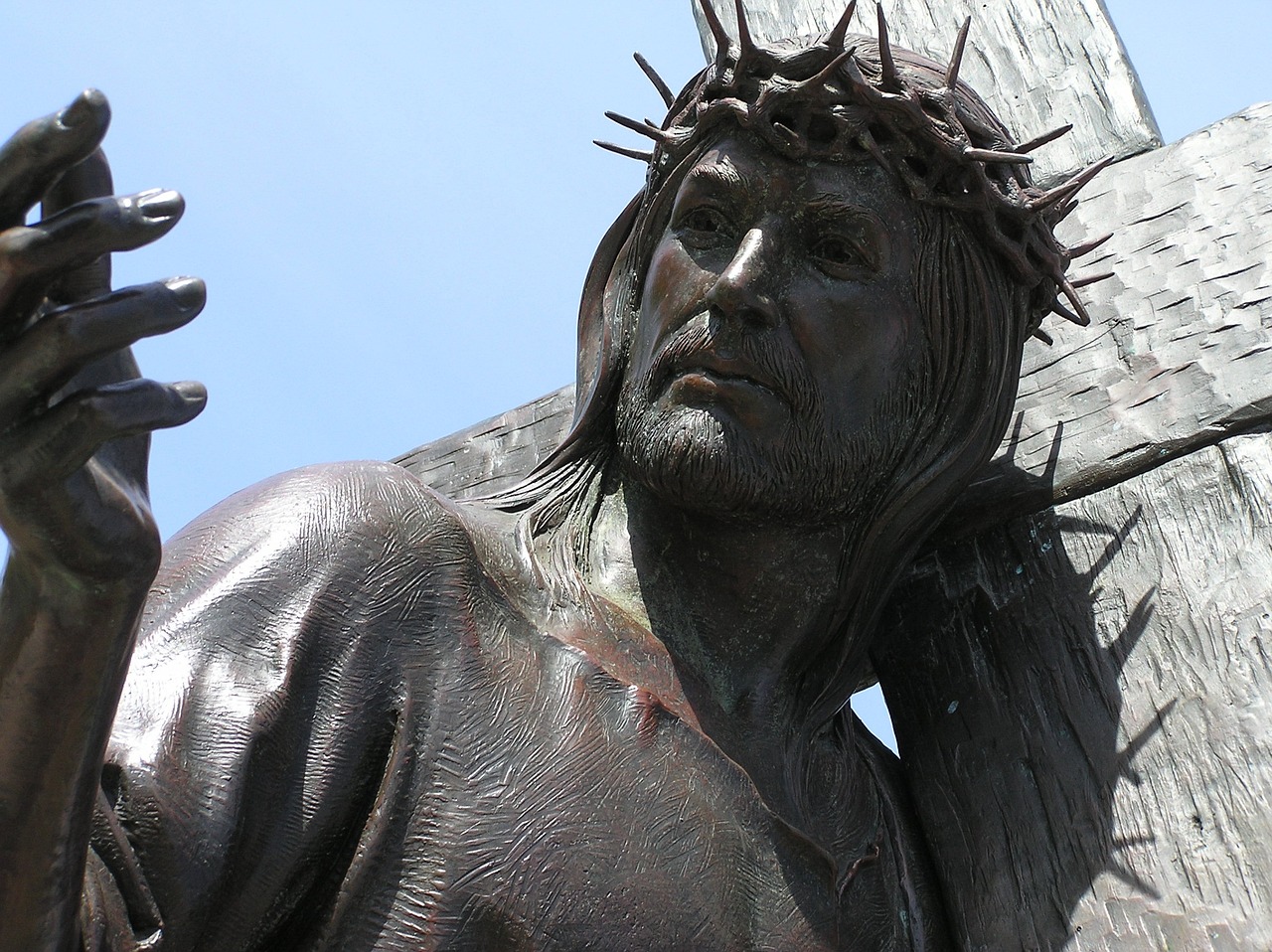For 40 days of the sacred season of Lent, we have been renewing and purifying our hearts, practicing self-denial and imitating God in his kindness by sharing with those who are in need, practicing virtue and fasting, overturning what the Preface for the First Sunday of Lent calls, “all the snares of the ancient serpent.”
Today, as we step over the threshold into the holiest of weeks, we encounter Mary of Bethany, her sister Martha, and their brother Lazarus. The Church puts the brakes on our preparation so that we may turn our gaze to Jesus, so that we may learn to serve Him, and love Him, and console Him, and surrender to Him.
There is a silence and calm inside this little home of Martha, Mary, and Lazarus. Step into Holy Week by stopping in the house of Bethany. Martha is quietly providing for Jesus and His band of apostles. Unruffled by the demands placed on her as hostess, and also quietly confident in Jesus as the Resurrection and the Life, she finds a prayerful peace within her loving service of the Friend who has meant so much to her.
Mary breaks a jar of costly nard and anoints the feet of Jesus. She had purchased the perfume with all the resources she had. Drying her Lord’s feet, not with a towel, but with her hair, she gave to Him all she was. Nard is a powerful fragrance used in preparation for burial. When applied to the skin or hair, its scent would fill an entire house and the aroma would remain for weeks.
In a few days time, Jesus would be arrested, brought before the Sanhedrin, mocked and scourged and crowned with thorns, condemned by Pilate and crucified on Calvary. When He was alone in prison, when He sat on a mock throne and received the jeering of the guards who robed Him in purple as they pressed thorns into His head, as He struggled and stumbled to Calvary, the scent of Mary’s loving gift comforted Him. Even as He died, He knew that countless souls through history would, like Mary, seek to love and console Him.
Lazarus, called out from the tomb four days after his death, sat beside Jesus. He knew that many were believing in Jesus now because of this miracle, and he realized that others wanted Jesus dead because of him. Perhaps he felt confused about what he should feel. Nevertheless, Lazarus remained at table with Jesus, staying near him, supporting him in any way he could.
So as you begin this Holy Week and you turn your gaze to Jesus, take a moment of peaceful prayer. Are you like Martha with her quiet service? Like Mary with her extravagant love? Like Lazarus, remaining near him? Or is there another way in which you are with Jesus this year as you enter Holy Week?
Durante los 40 días de la sagrada temporada de Cuaresma, hemos estado renovando y purificando nuestros corazones, practicando la abnegación e imitando a Dios en su bondad al compartir con los necesitados, practicando la virtud y el ayuno, derribando lo que el Prefacio del Primer Domingo de Cuaresma llama “todas las trampas de la serpiente antigua”.
Hoy, al cruzar el umbral hacia la semana más santa, nos encontramos con María de Betania, su hermana Marta y su hermano Lázaro. La Iglesia pone freno a nuestra preparación para que volvamos nuestra mirada hacia Jesús, para que aprendamos a servirlo, amarlo, consolarlo y entregarnos a Él.
Hay silencio y calma dentro de esta casita de Marta, María y Lázaro. Entremos en la Semana Santa deteniéndonos en la casa de Betania. Marta está cuidando silenciosamente a Jesús y a su grupo de apóstoles. Sin inmutarse por las exigencias que se le imponen como anfitriona, y también confiando tranquilamente en Jesús como la Resurrección y la Vida, encuentra una paz de oración en su servicio amoroso al Amigo que ha significado tanto para ella.
María rompe un frasco de nardo costoso y unge los pies de Jesús. Había comprado el perfume con todos los recursos que tenía. Secando los pies de su Señor, no con una toalla, sino con su cabello, le dio todo lo que era. El nardo es una fragancia poderosa que se utiliza en preparación para el entierro. Cuando se aplica sobre la piel o el cabello, su aroma llenaría una casa entera y permanecería durante semanas.
En pocos días, Jesús sería arrestado, llevado ante el Sanedrín, burlado, azotado y coronado de espinas, condenado por Pilato y crucificado en el Calvario. Cuando estaba solo en la prisión, cuando se sentaba en un trono simulado y recibía las burlas de los guardias que lo vestían de púrpura mientras le clavaban espinas en la cabeza, mientras luchaba y tropezaba hacia el Calvario, el aroma del regalo amoroso de María lo reconfortaba. Incluso mientras moría, sabía que innumerables almas a lo largo de la historia, como María, buscarían amarlo y consolarlo.
Lázaro, llamado a salir de la tumba cuatro días después de su muerte, se sentó al lado de Jesús. Sabía que muchos estaban creyendo en Jesús ahora debido a este milagro, y que, por lo mismo, otros querían que Jesús muriera. Tal vez se sentía confundido sobre lo que debía sentir. Sin embargo, Lázaro permaneció en la mesa con Jesús, permaneciendo cerca de él, apoyándolo en todo lo que podía.
Así que, al comenzar esta Semana Santa y dirigir tu mirada hacia Jesús, toma un momento para la oración silenciosa. ¿Eres como Marta con su servicio silencioso? ¿Como María con su amor extravagante? ¿Como Lázaro, permaneciendo cerca de él? ¿O hay otra manera en la que estás con Jesús este año al entrar en la Semana Santa?

Sr. Kathryn James Hermes, FSP, is an author and offers online evangelization as well as spiritual formation for people on their journey of spiritual transformation and inner healing. Website: www.touchingthesunrise.com My Books: https://touchingthesunrise.com/books/
Public Facebook Group: https://www.facebook.com/groups/srkathrynhermes/ HeartWork Spiritual Formation Group: https://touchingthesunrise.com/heartwork/
Feature Image Credit: David Trinks, unsplash.com/photos/a-statue-of-a-man-holding-a-baby-hBcr0cYlvHU
The views and opinions expressed in the Inspiration Daily blog are solely those of the original authors and contributors. These views and opinions do not necessarily represent those of Diocesan, the Diocesan staff, or other contributors to this blog.


 Felix Urcia was born in Lima, Peru. He emigrated the U.S. to complete his college degree in Computer Science at Northern Kentucky University. He is passionate about his faith, his family, education and soccer. When he is not homeschooling and caring for his young children he enjoys personal programing projects and sports analysis. He and wife live in a small town in Western Michigan where they enjoy spending time with their five children.
Felix Urcia was born in Lima, Peru. He emigrated the U.S. to complete his college degree in Computer Science at Northern Kentucky University. He is passionate about his faith, his family, education and soccer. When he is not homeschooling and caring for his young children he enjoys personal programing projects and sports analysis. He and wife live in a small town in Western Michigan where they enjoy spending time with their five children.
 Lily, age 23, is a Michigan native and cradle Catholic who has spent most of her life exploring her own reasons to embrace her faith fully. She attended Franciscan University of Steubenville, where she discovered the beauty of her personal relationship with Christ and the Church. After college, she worked in Montessori Education for three years and recently transitioned to nannying. She is excitedly preparing for marriage in May 2025 and spends most of her time reading, wedding planning, and enjoying her dog and family!
Lily, age 23, is a Michigan native and cradle Catholic who has spent most of her life exploring her own reasons to embrace her faith fully. She attended Franciscan University of Steubenville, where she discovered the beauty of her personal relationship with Christ and the Church. After college, she worked in Montessori Education for three years and recently transitioned to nannying. She is excitedly preparing for marriage in May 2025 and spends most of her time reading, wedding planning, and enjoying her dog and family!
 Colleen Orchanian is a podcaster, blogger, and spiritual director who desires to help others have a more profound encounter with God. She is the author of three books: Nearer My God to Thee, Times of Grace, and Lingering with God. Her podcast is Food for Thought (Spiritually Speaking). You can learn more at
Colleen Orchanian is a podcaster, blogger, and spiritual director who desires to help others have a more profound encounter with God. She is the author of three books: Nearer My God to Thee, Times of Grace, and Lingering with God. Her podcast is Food for Thought (Spiritually Speaking). You can learn more at 
 Kate Taliaferro is an Air Force wife and mother. She is blessed to be able to homeschool, bake bread and fold endless piles of laundry. When not planning a school day, writing a blog post or cooking pasta, Kate can be found curled up with a book or working with some kind of fiber craft. Kate blogs at
Kate Taliaferro is an Air Force wife and mother. She is blessed to be able to homeschool, bake bread and fold endless piles of laundry. When not planning a school day, writing a blog post or cooking pasta, Kate can be found curled up with a book or working with some kind of fiber craft. Kate blogs at 
 Ben Hooper is originally from Maryland, having been adopted from Korea and growing up in the Catholic faith. He went to Franciscan University to dive deeper into his faith and eventually graduated with a degree in Business Management. He loves musical theater, sports, spending time with his fiancé Lily and their dog Kolbe.
Ben Hooper is originally from Maryland, having been adopted from Korea and growing up in the Catholic faith. He went to Franciscan University to dive deeper into his faith and eventually graduated with a degree in Business Management. He loves musical theater, sports, spending time with his fiancé Lily and their dog Kolbe.
 Allison Gingras (
Allison Gingras (


 Kathryn Mulderink, MA, is married to Robert, Station Manager for Holy Family Radio. Together they have seven children (including Father Rob), and eleven grandchildren. She is President of the local community of Secular Discalced Carmelites and has published five books and many articles. Over the last 30 years, she has worked as a teacher, headmistress, catechist, Pastoral Associate, and DRE, and as a writer and voice talent for Catholic Radio. Currently, she serves the Church by writing and speaking, and by collaborating with various parishes and to lead others to encounter Christ and engage their faith. Her website is
Kathryn Mulderink, MA, is married to Robert, Station Manager for Holy Family Radio. Together they have seven children (including Father Rob), and eleven grandchildren. She is President of the local community of Secular Discalced Carmelites and has published five books and many articles. Over the last 30 years, she has worked as a teacher, headmistress, catechist, Pastoral Associate, and DRE, and as a writer and voice talent for Catholic Radio. Currently, she serves the Church by writing and speaking, and by collaborating with various parishes and to lead others to encounter Christ and engage their faith. Her website is 
 Kimberly Andrich writes from the perspective of having a hidden, chronic illness and experiencing a deep, continuous conversion through being yoked to Jesus in the day-to-day trials and joys of life. She is a wife, mother of 5, and daughter of the King. Kimberly also writes for
Kimberly Andrich writes from the perspective of having a hidden, chronic illness and experiencing a deep, continuous conversion through being yoked to Jesus in the day-to-day trials and joys of life. She is a wife, mother of 5, and daughter of the King. Kimberly also writes for 


 Tami Urcia is a midwestern gal from a large Catholic family. As a young adulthood she was a missionary in Mexico, where she studied theology and philosophy. After returning stateside bilingual, she gained a variety of work experience, traveled extensively and finished her Bachelor’s Degree at Brescia University. She loves organizing and simplifying things, watching her children play sports, deep conversations with close family and friends and finding unique ways to brighten others’ day with Christ’s love. She works full time at Diocesan in the Software Department and manages the Inspiration Daily reflections. She is also a contributing writer on
Tami Urcia is a midwestern gal from a large Catholic family. As a young adulthood she was a missionary in Mexico, where she studied theology and philosophy. After returning stateside bilingual, she gained a variety of work experience, traveled extensively and finished her Bachelor’s Degree at Brescia University. She loves organizing and simplifying things, watching her children play sports, deep conversations with close family and friends and finding unique ways to brighten others’ day with Christ’s love. She works full time at Diocesan in the Software Department and manages the Inspiration Daily reflections. She is also a contributing writer on 